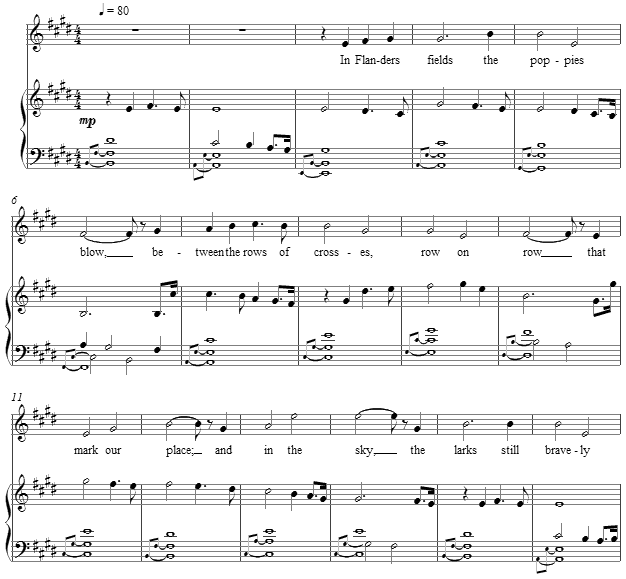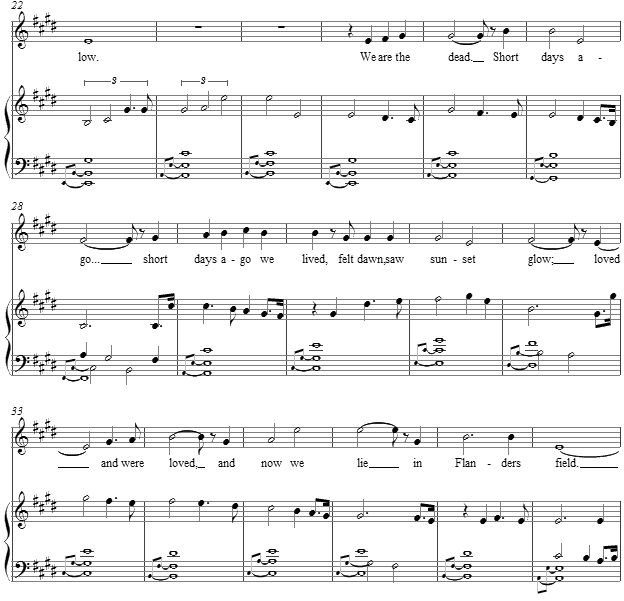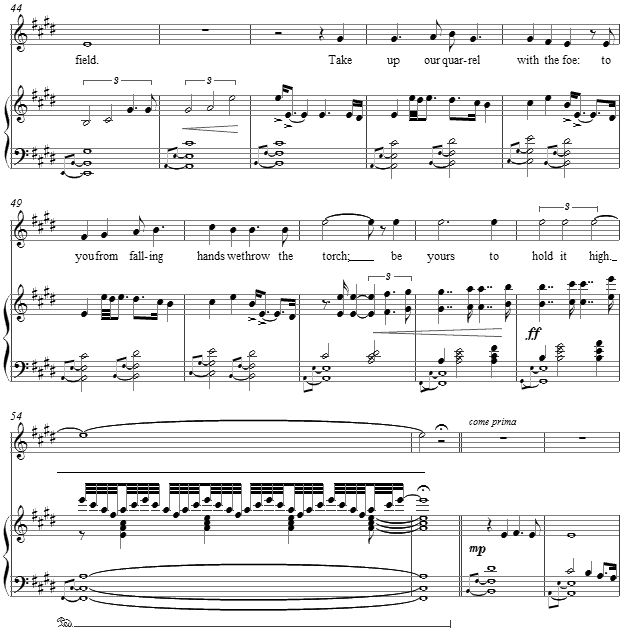Music and Texts of GARY BACHLUND
Vocal Music | Piano | Organ | Chamber Music | Orchestral | Articles and Commentary | Poems and Stories | Miscellany | FAQs
In Flanders Fields - (2008)
John McCrae
for medium or medium high voice and piano
to the war dead who have fought for freedom for others as for themselves
In Flanders fields the poppies blow
Between the crosses row on row,
That mark our place; and in the sky
The larks, still bravely singing, fly
Scarce heard amid the guns below.
We are the Dead. Short days ago
We lived, felt dawn, saw sunset glow,
Loved and were loved, and now we lie
In Flanders fields.
Take up our quarrel with the foe:
To you from failing hands we throw
The torch; be yours to hold it high.
If ye break faith with us who die
We shall not sleep, though poppies grow
In Flanders fields.[ 4 pages, circa 4' 20" ]
John McCrae
Lieutenant Colonel John Alexander McCrae, MD (1872- 1918) was a Canadian poet, physician, author, artist and soldier during World War I and a surgeon during the battle of Ypres. He is best known for writing the famous war memorial poem In Flanders Fields. 'In Flanders Fields' appeared anonymously in Punch on December 8, 1915, but in the index to that year McCrae was named as the author. The verses swiftly became one of the most popular poems of the war, used in countless fund-raising campaigns. On January 28, 1918, while still commanding No 3 Canadian General Hospital (McGill) at Boulogne, McCrae died of pneumonia. He was buried with full honours in the Commonwealth War Graves Commission section of Wimereux Cemetery, just a couple of kilometers up the coast from Boulogne. A collection of his poetry, In Flanders Fields and Other Poems (1918), was published after his death.
Paul Fussell writes in The Great War and Modern Memory, "Each image accurately triggers off its expected emotional response. We have the red flowers of traditional pastoral elegy--which go back to Milton (and beyond); the crosses which suggest the idea of Calvary and sacrifice; the sky as seen from a trench; the larks singing in the midst of the horrors and terrors of man's greatest folly; the contrast between the song of the larks and the voice of the guns; the special significance of dawn and sunset with the anticipated echoes of Gray's Elegy; the conception of soldiers as lovers; and the antithesis drawn between beds and graves."
tessitura for high voice
The setting is in a sweet and somber duple meter, a singing voice in the accompaniment to contrast with the vocal line itself. The form is a simple song form, a-a-b-a, in which the repetitions of the opening statement are amended to the purposes and scansion of the text.
The second strophe the vocal line which spoke first of poppies blowing in the wind now refers to "the dead" with al those feeling-filled images which the living know.
The very short bridge challenges us, as does the poem, to join in the "quarrel." For this, the harmonic rhythm doubles in time and the top line of the accompaniment becomes more decorated and aggressive. As there are so many ways in which one may fight for freedom, we might take this challenge seriously. As with the setting of Sandburg's Government which I set yesterday, the two poems have an interesting kinship, for it is against that government which would enslave others, in any way, that we find our "quarrel," in the words of McCrae.
The score for In Flanders Fields is available as a free PDF download, though any major commercial performance or recording of the work is prohibited without prior arrangement with the composer. Click on the graphic below for this piano-vocal score.
tessitura for low voice



